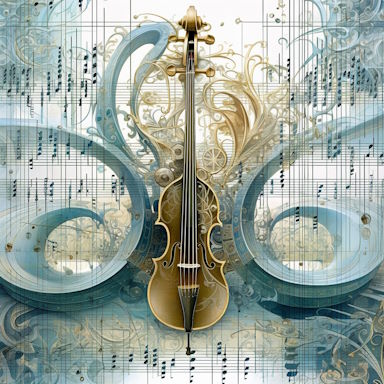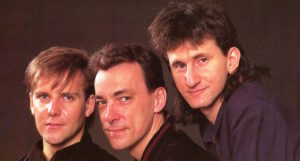
I am a life-long music lover. I enjoy a wide variety of styles, but my favorite is the truly innovative rock from the mid-60s through the 80s (often called “Progressive Rock”). I was also raised on Classical Music, which I still love, but with significant limitations (see below). There are other musical styles I enjoy (e.g., Reggae), but am not that knowledgeable about and find it difficult to find the “diamonds in the rough.”
Classical
I grew up on Classical music, and some of it is amazing. But despite listening to it much of my life and studying it in college, my appreciation for it is somewhat narrow. To start with, what is commonly lumped together as “Classical” is actually a range of styles over the centuries:
Medieval/Renaissance > Baroque > Classical > Romantic > ??? (disputed)
The Baroque era is typically identified with J. S. Bach, and for good reason. In fact, the “official” end of the Baroque era is considered to be 1750, the year he died. Unappreciated in his lifetime, he was regarded primarily as a kick-ass church organist. It was well after his death that the unbelievable volume of work he had written was recognized and appreciated. Bach wrote so much sheet music (all by hand) that if you stacked it all up, it would go from the floor to a standard 8′ ceiling twice. And nearly all of it had very complicated counterpoint (multiple themes going in and out of harmony with each other in cycles). Bach had a genius for this that was probably unmatched. Unfortunately, most Baroque music sounds very boring to us now. There are no changes of tempo, or build ups to crescendos, or anything like that. Baroque music is just a presentation of a very detailed mathematical structure, but largely without either passion or progress.
The Classical era is truly the golden age of “ancient” music. Beginning with Bach’s death in 1750 and continuing until roughly 1825, the Classical era blended the complex technical counterpoint of the Baroque with lovely melodies that would wax and wane, musical progressions that were designed to engage the audience’s emotions, and constructions that were deliberately intended to surprise. This 75 year era was absolutely dominated by Joseph Haydn and Wolfgang Amadeus Mozart (who were close friends and corresponded most of their life.) Haydn is credited with creating the traditional Symphony format, and was the true master of the Classical symphony. He composed over 105 symphonies, most of which still exist, and most of which are brilliant. To my mind, the genius of Haydn has never been matched. Of course, Mozart was no slouch either, creating 41 symphonies and many concertos, sonatas, operas, etc. While Haydn was the father of the symphony, Mozart was the father of the Classical concerto. Beethoven‘s earliest work (his first two symphonies) also fall into the Classical era.
After 1825, we enter the “Romantic” era. And, for me at least, the quality of music goes downhill in a hurry. The Romantic is a continuation of the trend that was Baroque to Classical. Romantic era music has even more dynamic structure, more variation, and more intended emotional effect. Beethoven used this to great effect in his remaining symphonies, his totally unmatched violin concertos, and other miscellaneous works. But this was a chaotic period of experimentation and I found very little of it moving. Mendelssohn did some fine work. And you can find some other outliers, like Dvorak’s New World Symphony. But things are getting rough… We have more and more of a move toward “programmatic” music – music that is intended to tell a story. (Think of The Sorcerer’s Apprentice from Fantasia as an example of where this is headed.) Most of the music from this era doesn’t move me at all. That said, much later, this style was successfully reproduced for movie soundtracks, such as John William’s amazing work on soundtracks to Superman, Star Wars, and Battlestar Galactica. But such use appears to have totally died off after the ’80s for some reason.
There’s no real agreement on what “era” comes next, as the “classical” (symphonic) thing was no longer distinct, any many (probably most) alive today aren’t even aware that new compositions are still being written for symphony orchestras. But in my view, as time went on, the worse symphonic music got. Aaron Copeland, born in 1900, wrote Americana-themed music. Listening to it is only slightly less painful than listening to Baby Shark. And that’s not even the bottom. A separate idea of “atonal music” was also being developed. Instead of having “keys” of notes that harmonize, and occasional deviations wander into accidentals only to bring us back to glorious harmony, let’s just do away with all of that. In fact, let’s use math to make sure that every tone is used exactly the same amount, just to be absolutely sure that no harmonious melodies emerge. Arnold Schoenberg is the most notable composer of this anti-music.
Progressive Rock

Progressive Rock doesn’t really have a formal definition, although more innovative rock from the era is classified as such. And now, when someone mentions Progressive Rock, Rush is the band everyone thinks of. Which is interesting – although they’re certainly one of the most talented bands ever, at the time they weren’t especially popular.
Modern, interesting “progressive” rock really got going around ’66 and ’67. From The Beatles we had Revolver and Sgt. Pepper’s, which really turned the corner from great Rock & Roll to inspired genius. ’66 also saw the release of Pet Sounds by The Beach Boys, their ground-breaking masterpiece. ’67 saw the release of Days of Future Passed by The Moody Blues, The Who Sell Out, Pink Floyd’s Piper at the Gates of Dawn, and Jefferson Airplane’s Surrealistic Pillow. And the solo debut by Scott Walker. And the debut of Procol Harum. Plus great albums from Bob Dylan, The Rolling Stones, James Brown, The Doors, Buffalo Springfield, The Jimi Hendrix Experience, Cream, Leonard Cohen, and The Kinks. And this list is by no means complete. It was an exciting time of wild innovation and kicked off what I consider the golden age of modern music.